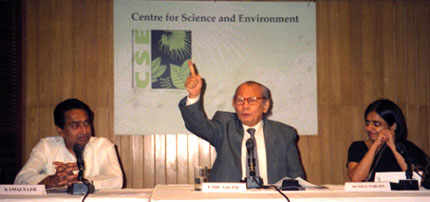
|
(From L to R) Kamalnath, MP and leader of Indian delegation to the
1992 Earth Summit; Emil Salim, Chair of the preparatory meetings to WSSD and former
Indonesian minister of environment, and Sunita Narain, Director, CSE
click for larger downloadable image |
Rich country governments have expressed their
willingness to deal with world poverty but are unwilling to commit to any firm targets,
WSSD chair and former Indonesian environment minister Emil Salim said at a public
discussion organised by the Centre for Science and Environment in New Delhi on August 1,
2002. While listing five key battles that developing countries will have to fight at the
Summit, Salim called on the Indian Prime Minister to lead his delegation -- and the
developing world – to Johannesburg.
Governments met in Bali in May this year to discuss the text
that will be signed at the Summit. But the meeting ended in disagreement, resulting in
widespread fears that WSSD would end in similar disaster. According to Salim, the five
contentious issues that could decide the Summit's fate include:
- getting governments to commit to concrete time schedules
- globalisation
- trade
- finance, and
- the principle of common but differentiated responsibility.
The negotiating text for the Summit is long on words and promises, but short on
deadlines. Meanwhile, globalisation is currently working against poor countries rather
than for them. Salim cited the example of Indonesia, which is rich in copper, aluminum and
tin. But while these are exported in the raw form, Indonesians cannot add value to these
export-processed goods to earn more. This is because the import duties for processed goods
are kept very high in industrialised ountries. "Developing countries do not
have a level playing field," Salim said.
World trade remains heavily biased in favour of
industrialised countries. For instance, despite promises to reduce farm subsidies at the
Doha, Qatar meeting of the World Trade Organisation (WTO), the US announced massive
agricultural subsidies for its farmers in April this year. This was done to please
domestic farmers, whose votes will be important for the mid-term election to be held in
the US in November.
Finance has always been a sticky issue between the North and South. At the meeting on
Finance for Development in Monterrey, Mexico, in March earlier this year, rich countries
refrained from making any concrete pledges to increase funding, but made some
"announcements" that amounted to significantly less than the 0.7 per cent of GDP
they had agreed to in the past. There was no discussion at Monterrey on the
counter-productive conditions that come with the aid, and there is likely to be no
discussion on this in Jo'burg.
The dispute over the principle of "common but differentiated responsibilities"
at the WSSD negotiations has struck a particularly sour note with developing countries.
The principle implies that while both rich and poor countries have a responsibility to
protect the world's environment, the contribution of rich countries to the destruction of
the environment has been greater so far, and so the rich should take the lead in taking
remedial action.
As Kamalnath, former Indian environment minister pointed out at the public discussion,
the Indian government led the G77 group of developing countries in fighting for this
principle at the 1992 Rio Earth Summit. Several environmental treaties since then have
been based on this edifice -- for instance, under the climate change convention, rich
countries have to reduce their harmful greenhouse gases first, while poor countries can
increase their emissions in the interests of meeting the developmental needs of their
people.
Despite Salim's pleas for Indian leadership, it is unlikely that Prime Minister
Vajpayee will attend WSSD, although the final decision may hinge on whether Chinese
premiere Zhu Rongji decides to attend.
According to a joint secretary of the Ministry of External Affairs, this decision was
taken because "a lot of our expectations were dashed". Salim felt the
involvement of Asia in the summit so far has been particularly disappointing. While
several European, African and Latin American leaders have committed to attend the summit,
there has been a poor response from Asia. The world is also waiting to see whether US
President George W Bush, who has come under considerable global censure for his
anti-environment policies, will attend WSSD.
Reminiscing about his role as head of the Indian delegation to the 1992 Rio Earth
Summit, Kamalnath noted that that was the height of multilateralism. But WSSD will take
place at a time when unilateralism -- particularly unilateralism from one of the richest
and most polluting countries of the world -- is at its peak. This does not bode well for a
meeting that is touted by many as the last chance to save the world.
Background Note
- In 1992, the United Nations Conference on Environment and Development (UNCED) took place
in Rio de Janeiro. UNCED resulted in the adoption of Agenda 21 -- a legally non-binding
blueprint for governments to promote 'sustainable development'.
- In 1997, a five-year review of UNCED agreed that UNCED had by and large failed to
deliver. In particular,

